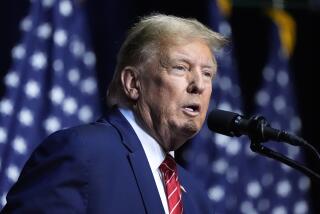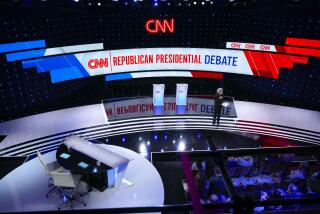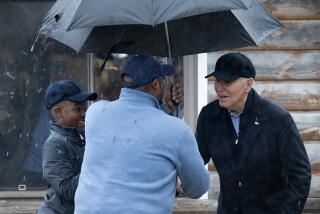Mitt Romney’s sparse campaign schedule worries some Republicans
When the political conventions ended in 2008, GOP candidate John McCain bounded around the country like a jack rabbit. In three days, he went from Wisconsin to Michigan to Colorado to New Mexico to Missouri, with multiple campaign appearances in some of those states.
Mitt Romney’s schedule this year has presented quite a contrast.
In his first two days of campaigning after the conventions, Romney visited Iowa, New Hampshire and Virginia, with one stop in each state. Then he went home to Boston and took a day off from the campaign trail.
That, as it turns out, has been Romney’s most active period of campaigning since the presidential contest moved into its crucial post-convention stage. Although his campaign says he is about to accelerate his pace, Romney so far has held far fewer public events than either presidential candidate did four years ago, and has spent a significant amount of time in states — Massachusetts, California, New York, Texas — that are not considered up for grabs in November.
Most of that time has been spent fundraising or preparing for his three coming debates with President Obama. “Gov. Romney’s schedule is packed virtually nonstop with campaign events, fundraisers, debate prep, meeting with voters and all the other things that go into a national campaign,” spokeswoman Andrea Saul said in defending his campaign clip.
Still, some Republicans are beginning to get restive.
“Of all the times when he needs to be seen talking about the economy and job creation with average Americans ... it’s now,” said John Weaver, a veteran GOP political consultant who served as an advisor to McCain in 2000 and for a portion of his 2008 campaign. “To be doing fundraising events in Costa Mesa and Utah and Texas … they’re going to have to change that. He is the challenger. He’s going to have to work harder.”
Romney aides contend that, as the challenger, he has no choice but to raise more money than Obama. And unlike Obama, Romney had to spend a significant amount of money in a long and hotly contested Republican primary.
Obama has held only slightly more campaign appearances than Romney, but as the sitting president, he has an excuse: He is supposed to be running the country.
The attention garnered for that, of course, is an advantage for any incumbent. Some of Obama’s most effective moments in the public eye lately have been at non-campaign events, such as when he held a solemn ceremony after the bodies of a U.S. ambassador and three other Americans were returned home from Libya.
The president, to be sure, has also spent enormous amounts of time raising campaign cash, usually in states — California, New York — that he is certain to win and where he has no need to campaign.
“The fundraising pressures on both campaigns are tremendous,” said Dan Schnur, a former Republican political consultant who now runs the Jesse M. Unruh Institute of Politics at USC. “Romney’s in Texas, Obama’s in New York. They’re both spending a lot of time in places where there is a lot more money available to them than votes.”
Romney’s busy fundraising schedule comes despite the fact that his campaign is flush with cash. Together with the Republican National Committee, it had $168.5 million in the bank at the end of August. In each of the last three months, Romney’s campaign raked in more than $100 million.
But there is a constant press for more money, largely because Romney and Obama declined to take public financing, which would have limited each to spending a $91.2-million public grant in the general election.
“Since the presidential public funding system has collapsed, effectively, because of nonuse, we have a system where candidates are spending an inordinate amount of time fundraising,” said Larry Noble, president of Americans for Campaign Reform. “They don’t see that they have any choice.”
In the 12 days from Sept. 7, the day after the Democratic convention ended and the fall campaign began in earnest, to this Tuesday, Romney held seven public campaign events and delivered a policy speech to the National Guard Assn. on Sept. 11. Mixed in were numerous private fundraisers, including events in New York, Chicago, Costa Mesa, Salt Lake City and Jacksonville, Fla.
During the comparable period of 2008, McCain and Obama held more than 20 public campaign events each. Where they held fundraisers, they typically tried to campaign nearby, ideally in the closest swing state. Romney has not often done that. (McCain accepted public financing for the general election; Obama did not.)
In Republican circles, talk about Romney’s campaign tactics has begun to morph from concern to alarm as polls show Obama pulling ahead in some key swing states.
“Romney doesn’t seem to be out there campaigning enough,” conservative writer and former Reagan speechwriter Peggy Noonan wrote in a scathing blog post this week. “He seems — in this he is exactly like the president — to always be disappearing into fund-raisers, and not having enough big public events.”
The Associated Press quoted Sen. Lindsey Graham (R-S.C.) as saying that Romney would not lose many voters because of the videotape that Mother Jones magazine released this week in which Romney said almost half the public would vote for Obama because they received government entitlements and lacked personal responsibility. But, Graham said, Romney must campaign harder.
“This is our election to lose,” Graham said. “There’s a reason no president has ever been elected with economic numbers like this. If Obama wins, he’ll be rewriting political history.”
Romney’s schedule for the next week suggests that he got the memo. It includes two-day campaign swings through Colorado and Ohio, as well as campaigning in Florida and Nevada and delivering speeches at a Clinton Global Initiative meeting and the Education Nation conference.
Romney’s critics on the right tend to emphasize that he still has time.
“I think they’ve made a calculation that raising money and debate prep time is the most valuable use of Romney’s time,” said Mark McKinnon, a key strategist for President George W. Bush in 2000 and 2004. “The problem is that it is creating a perception of a campaign in trouble that is not working that hard. But if Romney knocks it out of the park at the debates and overwhelms Obama in the closing weeks with a money advantage, the critics will reconsider.”
mitchell.landsberg@latimes.com
Times staff writers Melanie Mason, Matea Gold and Joseph Tanfani in Washington contributed to this report.
More to Read
Start your day right
Sign up for Essential California for news, features and recommendations from the L.A. Times and beyond in your inbox six days a week.
You may occasionally receive promotional content from the Los Angeles Times.







